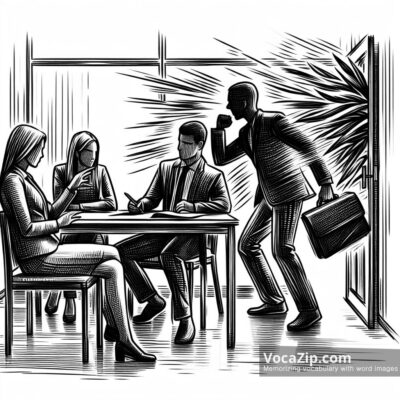disturb meaning
disturb :
to interrupt, to bother
Verb
▪ Please do not disturb me while I am working.
▪ Please do not bother me while I am working.
▪ The noise disturbed the baby’s sleep.
▪ The noise interrupted the baby’s sleep.
paraphrasing
▪ interrupt – to stop briefly
▪ bother – to annoy
▪ upset – to make uncomfortable
▪ disrupt – to cause disorder

Pronunciation
disturb [dɪˈstɜːrb]
The stress is on 'sturb' and sounds like 'di-sturb'.
Common phrases and grammar about disturb
disturb - Common meaning
Verb
to interrupt, to bother
Part of Speech Changes for "disturb"
▪ disturbance (noun) – an interruption or bother
▪ disturbed (adjective) – interrupted or bothered
Common Expressions with "disturb"
▪ disturb the peace – to interrupt calmness
▪ disturb someone’s sleep – to bother someone while they sleep
▪ disturb the order – to cause disorder
▪ do not disturb – a request not to be interrupted
Important examples of disturb in TOEIC
Vocabulary examples from the TOEIC test
In TOEIC vocabulary questions, disturb often means to interrupt or bother someone.
Example of a confusing word: disrupt (to cause disorder)
Grammar examples from the TOEIC test
Disturb is often used in grammar questions as a transitive verb, requiring an object.
disturb
Idioms and fixed expressions in TOEIC
disturb the peace
means 'to interrupt calmness', used in legal contexts.
rock the boat
means 'to cause trouble or disturb a situation'.
Differences between similar words and disturb
disturb
,
interrupt
differences
Disturb means to bother someone, while interrupt means to stop someone briefly.
disturb
,
bother
differences
Disturb means to interrupt or bother, while bother is more about annoying someone.
Words with the same origin as disturb
The origin of disturb
disturb comes from the Latin 'disturbare', meaning 'to throw into disorder'.
Word structure
It has the prefix dis (apart), root turb (to throw), and means 'to throw apart'.
Words with the same origin
The root of disturb is turb (to throw). Words with the same root include perturb (to make uneasy), turbine (a machine that spins).
Please select an image in the quiz
Previous post and next post







